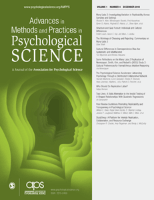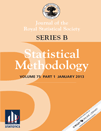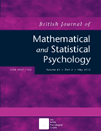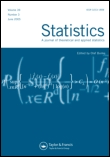
Advances in Methods and Practices in Psychological Science
Scope & Guideline
To Pioneer New Frontiers in Psychological Methodology.
Introduction
Aims and Scopes
- Methodological Rigor:
The journal emphasizes the importance of robust methodological practices in psychology, promoting tutorials and studies that explore advanced statistical techniques and their appropriate applications. - Open Science Practices:
A core focus is on advancing open science initiatives, including preregistration, data sharing, and transparent reporting, which aim to enhance the reproducibility and credibility of psychological research. - Diversity in Research Approaches:
The journal encourages diverse research methodologies, including qualitative, quantitative, and mixed methods, alongside innovative data collection techniques such as experience sampling and ecological momentary assessment. - Educational Resources:
It aims to provide educational materials and tutorials that empower researchers to effectively utilize advanced statistical methods, thereby improving the overall quality of psychological research. - Causal Inference:
A significant focus is placed on developing and disseminating methods for causal inference, particularly in complex designs such as longitudinal and experimental studies.
Trending and Emerging
- Bayesian Methods:
There is a noticeable increase in the application and discussion of Bayesian statistical methods, reflecting a shift towards more flexible and informative approaches to data analysis. - Experience Sampling Methodology:
The use of experience sampling and ecological momentary assessment has gained prominence, emphasizing real-time data collection and the study of behaviors and experiences in naturalistic settings. - Causal Inference Techniques:
A growing emphasis on causal inference methodologies, particularly through advanced designs like natural experiments and propensity score matching, indicates a trend towards understanding causality in psychological research. - Data Transparency and Open Practices:
An increasing focus on open science practices, including preregistration and transparency in data reporting, showcases the journal's commitment to enhancing research integrity and reproducibility. - Artificial Intelligence and Machine Learning:
Emerging discussions around the integration of machine learning and AI techniques in psychological research signal a trend towards leveraging technology for enhanced data analysis and insights.
Declining or Waning
- Traditional Statistical Approaches:
There seems to be a decline in the publication of studies relying solely on traditional statistical methods (e.g., t-tests, ANOVA) as the field increasingly embraces more complex and nuanced analytical techniques. - Generalized Findings from Small Samples:
Research that extrapolates findings from small or non-representative samples is less frequently published, indicating a growing consensus on the necessity of larger, more diverse sample sizes for generalizability. - Descriptive Studies without Analytical Depth:
There appears to be a reduction in purely descriptive studies that lack robust analytical frameworks, as the journal encourages more rigorous analytical approaches.
Similar Journals

Collabra-Psychology
Exploring Innovative Insights in PsychologyCollabra-Psychology is a premier, peer-reviewed journal published by University of California Press, focusing on the diverse and evolving landscape of psychology. Established in 2017 as a fully Open Access platform, Collabra-Psychology aims to foster innovative research and disseminate valuable findings to a global audience without barriers. It proudly holds a Q1 quartile ranking in the field of psychology (miscellaneous) for 2023, reflecting high levels of influence and quality within its domain. As part of the Scopus indexing, it ranks #88 out of 216 in general psychology, cementing its role as a critical resource for researchers, practitioners, and students alike. With a commitment to rigorous scholarship and interdisciplinary collaboration, Collabra-Psychology not only enhances the visibility of psychological research but also promotes discussions that bridge theoretical and practical applications. Located in the United States and with a forward-looking publication timeline extending to 2024, this journal is poised to remain at the forefront of psychological research and discourse.

JOURNAL OF THE ROYAL STATISTICAL SOCIETY SERIES B-STATISTICAL METHODOLOGY
Advancing Statistical Insight for Tomorrow's InnovatorsJOURNAL OF THE ROYAL STATISTICAL SOCIETY SERIES B-STATISTICAL METHODOLOGY, published by OXFORD UNIVERSITY PRESS, is a leading academic journal dedicated to advancing the field of statistical methodology. With a distinguished Q1 ranking in both Statistics and Probability and Statistics, Probability and Uncertainty as of 2023, this journal stands at the forefront of statistical research, serving as a vital resource for researchers, professionals, and students alike. The journal has been committed to fostering innovative statistical techniques and methodologies since its inception in 1997, covering a wide scope of topics that push the boundaries of statistical applications in various disciplines. Based in the United Kingdom, the journal maintains its reputation through rigorous peer-review practices and high-quality content, making it an indispensable platform for those looking to disseminate their findings and engage with current trends in statistical science. Although the journal does not offer open access, the impact and scholarly significance of its articles remain profoundly influential in shaping contemporary statistical discourse.

Methods Data Analyses
Connecting Researchers with Cutting-Edge MethodologiesMethods Data Analyses is a premier open-access journal published by GESIS Leibniz Institute for the Social Sciences, based in Germany. With its focus on advanced methodologies within various fields such as Applied Mathematics, Applied Psychology, Computer Science Applications, and Statistics, this journal plays a pivotal role in disseminating innovative research and practical applications that push the boundaries of quantitative analysis. As of 2023, it proudly holds Q1 status in both Applied Mathematics and Modeling and Simulation, reflecting its high impact and relevance in these disciplines. The journal is committed to promoting open access research since 2013, ensuring that critical methodologies and findings are available to a global audience. With Scopus rankings indicating robust standing across multiple categories, including Statistics and Decision Sciences, Methods Data Analyses stands as an essential resource for researchers, professionals, and students seeking to engage with cutting-edge approaches and frameworks that enhance analytical rigor in their work.

BMC Medical Research Methodology
Pioneering Innovations in Medical Research TechniquesBMC Medical Research Methodology is a prestigious open-access journal published by BMC, dedicated to advancing the field of medical research methodologies. Launched in 2001, the journal has established itself as a vital resource for researchers, reflecting its high-quality contributions with a strong Q1 ranking in both Epidemiology and Health Informatics as of 2023. As a scholarly platform, it offers broad access globally, ensuring that the latest developments in research methodology are readily available to professionals, scholars, and students alike. With its commitment to enhancing the rigor and transparency of medical research, BMC Medical Research Methodology plays a critical role in shaping the future of evidence-based practices, making it an essential read for anyone involved in medical research. The journal is based in the United Kingdom at CAMPUS, 4 Crinan St, London N1 9XW, England, and provides comprehensive access options to facilitate the dissemination of knowledge and foster collaboration across the global research community.

BRITISH JOURNAL OF MATHEMATICAL & STATISTICAL PSYCHOLOGY
Elevating Academic Discourse in Mathematical PsychologyThe British Journal of Mathematical & Statistical Psychology, published by Wiley, is a prestigious peer-reviewed journal that plays a pivotal role in advancing the interdisciplinary fields of psychology, mathematics, and statistics. With an ISSN of 0007-1102 and an E-ISSN of 2044-8317, it boasts a Category Quartile ranking of Q1 in diverse areas including Arts and Humanities, Medicine, Psychology, and Statistics and Probability as of 2023, signifying its considerable impact and relevance. This journal provides a platform for the dissemination of high-quality research and innovative methodological advancements that address complex psychological phenomena through rigorous statistical frameworks. It covers a breadth of topics from classic problems to modern data analytic techniques, appealing to researchers, professionals, and students alike. Founded in 1965, the journal continues to thrive global scholarly dialogue until 2024, fostering collaboration among disciplines and enhancing understanding of psychological data. Although it is not an open access journal, its rigorous selection process ensures that only the most significant and impactful research is published, further maintaining its esteemed position within the academic community.

Data
Unlocking insights through open-access data exploration.Data is an innovative open-access journal published by MDPI, dedicated to advancing research and knowledge in the fields of Computer Science and Information Systems. Since its inception in 2016, Data has positioned itself as a prominent platform for disseminating high-quality research, currently boasting an impact factor reflective of its rigorous peer-review process and academic standards. Situated in Switzerland, the journal encompasses a broad scope of topics, making it an essential resource for researchers, professionals, and students alike. With a notable standing in multiple categories—including Q2 rankings in Information Systems and Information Systems and Management—the journal facilitates access to cutting-edge findings and methodologies that drive innovation in data management and analysis. Scholars are encouraged to utilize this open-access platform to share their findings and contribute to the collective understanding in these rapidly evolving fields.

Behavior Research Methods
Exploring groundbreaking approaches to understanding behavior.Behavior Research Methods is a premier, peer-reviewed journal published by Springer that holds a significant position within the fields of psychology and behavioral science. With its ISSN 1554-351X and E-ISSN 1554-3528, this esteemed journal has been a vital resource for researchers and practitioners since its inception in 1968. By providing insightful research on innovative methodologies in behavioral studies, it has achieved remarkable recognition, consistently ranking in the Q1 category across various psychological disciplines including Developmental and Educational Psychology, Experimental and Cognitive Psychology, and Arts and Humanities. Its current Scopus rankings place it firmly within the top echelons of academic journals, with impressive percentiles in several categories. The journal's objective is to advance knowledge and foster discourse on effective research methods related to human behavior, making it an essential platform for sharing groundbreaking findings and innovative approaches. While it does not offer open access, it continues to serve as a key reference for those looking to enhance their understanding of methodological advancements in behavior research. The journal is available to scholars and institutions both in the United States and globally, affirming its role as a beacon of scholarly excellence in psychology.

Statistical Theory and Related Fields
Connecting theory and practice in the world of statistics.Statistical Theory and Related Fields is a cutting-edge journal published by Taylor & Francis Ltd, dedicated to advancing the field of statistical theory and its applications across diverse disciplines. With an open access policy introduced in 2022, this journal strives to make high-quality research accessible to a global audience. Its ISSN 2475-4269 and E-ISSN 2475-4277 ensure that it is widely recognized in the academic community. The journal covers crucial topics ranked across various categories, including Q3 in Analysis and Applied Mathematics, and has a growing presence in important subfields of mathematics, as evidenced by its Scopus rankings. This positions it prominently as a valuable resource for researchers, professionals, and students seeking to explore and contribute to statistical theory and its related fields. With a commitment to fostering rigorous theoretical research, as well as practical applications, the journal plays a significant role in shaping the dialogue and advancements in statistics, probability, and computational theories.

PSYCHOLOGICAL METHODS
Shaping the Future of Psychology with Methodological PrecisionPsychological Methods, published by the American Psychological Association, is a leading journal in the field of psychology, recognized for its rigorous approach to the methodology of psychological research. With an ISSN of 1082-989X and an E-ISSN of 1939-1463, this esteemed journal facilitates the dissemination of innovative methods and analysis techniques that are critical for advancing psychological science. Its impressive ranking as Q1 in both the History and Philosophy of Science and Psychology (miscellaneous) categories underscores its influence, while its Scopus rank places it in the top 2 out of 97 journals in its field, reflecting its high visibility and importance among researchers, professionals, and students. Although not an open-access journal, Psychological Methods continues to serve as a vital resource for the latest advancements and discussions, aiming to enhance the quality of psychological research globally. With a publication history spanning from 1996 to 2024, it remains a cornerstone for scholars committed to elevating the methodological standards prevalent within the discipline.

STATISTICS
Fostering innovation in the realm of statistics and probability.STATISTICS is a distinguished journal published by Taylor & Francis Ltd, dedicated to advancing the field of statistical science since its inception in 1985. With a strong focus on both the theoretical and practical aspects of Statistics and Probability, this journal serves as a vital platform for researchers, professionals, and students seeking to disseminate their findings and contribute to critical discussions in the discipline. Although categorized in the Q3 quartile for both Statistics and Probability and Statistics, Probability and Uncertainty, the journal's commitment to quality research is evidenced by its inclusion in relevant Scopus rankings. It holds respectable positions, ranked #132/168 in Decision Sciences and #219/278 in Mathematics. By providing a venue for high-quality research articles and reviews, STATISTICS aims to foster innovation, reinforce methodological advancements, and address contemporary challenges in statistical applications. The journal does not currently offer open access, but it is widely distributed, ensuring that significant research reaches the communities that need it most. Researchers are encouraged to submit their work to this essential resource that continues to shape the landscape of statistical inquiry.